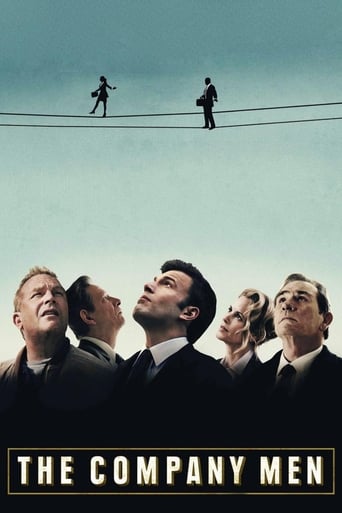

Continuing my plan to watch every Kevin Costner movie in order, I come to 2010's Company Men Plot In A Paragraph: A year in the life of three men (Ben Affleck, Tommy Lee Jones and Chris Cooper) trying to survive corporate downsizing at a major company, and how that affects them and their families.I will say from the off, I don't understand the hate that Affleck gets, as I usually enjoy his movies that vary in tone, style and subject matter drastically from Company Men, Armageddon, Argo, Reindeer Games, Dogma and Hollywoodland or the what I consider the under rated Jersey Girl (OK I may be on my own on that one lol) All different and I enjoy him in all of them. Tommy Lee Jones delivers his best performance in years and Chris Cooper is heartbreaking!! In a small role, Company Men features one of the best performances from the latter half of Kevin Costner's career!! I think he should have been nominated for Best Supporting Actor, however come nomination time, I was surprised as the movie didn't garner a single nomination. There is a stubborn arrogance to Affleck's character in the beginning, so it's kind of hard to root for him whilst he is driving round in a Porsche and spending time in his posh golf club, but as the movie goes on, and he is forced to take a manual job with KC, one he threw back in his face, scoffing at the very notion earlier in the movie, you do start to feel for him. All in all an excellent movie. It doesn't have a lot of rewatchable value for me as it is so depressing but it's great non the less.
... View MoreGTX Corporation used to be a ship builder, but it's now a conglomerate. Head man James Salinger (Craig T. Nelson) decides to cut jobs to improve the company's balance sheet, and boost the stock price. Phil Woodward (Chris Cooper) is a long time company man who started on the shop floor. Gene McClary (Tommy Lee Jones) is James Salinger's right hand man, and reluctantly executes the order. Bobby Walker (Ben Affleck) is a successful sales guy. When he's downsized, he has trouble dealing with it. His life with his wife Maggie (Rosemarie DeWitt) strains. Can he swallow his pride and ask brother-in-law Jack Dolan (Kevin Costner) for help?There are too many lead characters scattered in different directions. It diffuses all the emotional tension. Ben Affleck is playing his character too angry. It's a one-note performance that changes way too late. The final solution is too happy Hollywood. It makes the whole movie feel like a sermon. There really isn't any need for it especially if the filmmaker is shooting for some 'truth'.
... View MoreJohn Wells' The Company Men is the first film I've seen since Jacob Aaron Estes' The Details that makes a bold, commendable attempt at penetrating the interworkings of the male psyche. It shows diminishing feelings of a male's self worth and value after being fired from his job, using the 2007-08 economic crisis in the United States as the backdrop for this story. Considering how timely and significant this material is, it's unfortunate how forgotten and ignored this film is.The film follows the impact the crisis had on the fictional, multi-billion dollar business Global Transportation Systems ("GTX"), which is facing large and prolific downsizing after the market plummets. One of the men let go is Bob Walker (Ben Affleck), a responsible marketing agent who is used to driving to his beautifully furnished office in his silver Porsche five days a week before coming home to his wife and two children. At first, while upset, he is confident that he'll be employed and his six-figure salary reinstated at another white-collar firm. It is after weeks of applying, making phone calls, and lurking at an employment agency with little success or movement that he realizes just how poorly the U.S. economy is and how low ones self-worth can go after being the victim of downsizing.Meanwhile, the company CEO James Salinger (Craig T. Nelson) has little suffering, but almost every employee is left to fend for themselves in some way, shape, or form. Bob looks to his longtime friend and coworker Gene McClary (Tommy Lee Jones) for assistance, but finds he is struggling to keep his head above water as well. Finally, when all hope is lost, Bob reluctantly accepts a position hanging drywall with his brother-in-law Jack Dolan (Kevin Costner), who already views him as privileged and slightly ungrateful. This offers a relativistic moment in both Bob and Jack's life as they each wear each others shoes for a little while. Jack can see that while Bob is a mediocre carpenter, his heart was always in the right place and he was good at the white-collar work he did. Bob, on the other-hand, gets a greater experience, which is to see his brother-in-law as a man loyal to his job, as many working class and lower-middle class family-men are.These kinds of moments are the moments I live for in film - when two parties recognize another person's way of life or begin to accept and understand their peers without such a close-minded view of one another. Not to mention, Wells - who also serves as writer - does a nice job at showing the effect the loss of a six-figure income has on a family. Several cutbacks are made, less entertainment is had, and life becomes a day-to-day challenge rather than a fast-moving, leisurely exercise. Wells is careful to not make the cutbacks seem overwhelming and unrealistic (IE: making the entire Walker family live out of their car or on the street), but he makes them more close-to-home and believable - seeing Bob's Porsche get repossessed is surprisingly heartbreaking.This leads to what the film is trying to show, which is crudely but wisely dubbed "male vanity." The term is just what it sounds like; the encompassing thought of feeling macho and being the sole source of life in a family. Bob isn't a man drenched in full-blown vain, however, he's used to being the breadwinner of the family, and when that title, responsibility, and its privileges are revoked without the company of a pink-slip, Bob is like a superhero without superpowers. Overtime he feels vulnerable, weak, and an unworthy man of the house. Wells makes this feeling accessible to us, the audience member, by giving us a look into a typical suburban family that had it all and lost it and the people on top who walked away mostly unburdened. The film's tagline, "In America, we give our lives to our jobs; it's time to take them back" bluntly states this and makes one recount their own job, whether it be a nurse or a retail worker.Ben Affleck gives a strong performance here, embodying the commonality, the strength, and the present weaknesses of an upper-middle class suit. Affleck is one of the strongest actors in the business today in my opinion, diverse, a terrific presence in all of his films, witty, and very, very relatable. Accompanied by the likes of Tommy Lee Jones, Kevin Costner, Chris Cooper, Rosemarie DeWitt, and Maria Bello - all of whom are on top of their came - he can do no wrong.The Company Men not only humanizes the white collar world, but provides us with a timely humanization of the world and a look into the effects the financial crisis left far too many Americans.Starring: Ben Affleck, Tommy Lee Jones, Kevin Costner, Chris Cooper, Rosemarie DeWitt, Maria Bello, and Craig T. Nelson. Directed by: John Wells.
... View MoreIn the midst of economic turmoil the GTX corporation is downsized, not so much because of dire need, but due to shareholder pressure and necessity to project success via any means possible. All in order to keep the stock prices at a high. The story follows three victims of the corporate brutality: the middle aged sales exec Bobby Walker (Ben Affleck) and further down the line his superiors senior manager Phil Woodward (Chris Cooper) and the first company employee, CSO Gene McClary (Tommy Lee Jones). Bobby Walker gets hit with the reality slowly but surely, not ready to let go of his extravagant lifestyle with a spacious suburban house, regular golf outings and eating out almost everyday. However when mortgage payment start getting hit Bobby finally agrees to take on the job of his construction-worker brother-in-law, Jack Dolan (Kevin Costner).Toughest hit is 60-year-old Phil Woodward, who now lacks any traits making him employable. Too old to find a new career, but too low on the ladder to get offered positions in this tough economic climate. For Gene McClary, owner as vast shares at GTX, being fired on a golden parachute entails almost no financial problems, however it does bring out a disillusionment with his former CEO and best friend James Salinger (Craig T. Nelson), downsizing for personal gain, paying himself out hefty multimillion dollar profits, while thousands go unemployed. Now resetting to a world, where money is a product in itself, he reminisces of a time, when people knew their real worth building physical objects, not just functioning in an increasingly virtual and lopsided economy.With a story deserving better script treatment, the main issue comes from an almost total lack of connection with the three protagonists. Given the overall situation of millions working minimum wage jobs, the plight of three rich white guys going through a rough spot seems detached from the ordinary man. Despite the real tragedy that hits during the movie, the 'inconveniences' seem timid at best, barely cause you to flinch when Bobby Walker has to sell his beloved sports car (as if he really needed it). Given the overall consumerist culture attacking corporate and everyday America, the breath of reality barely resonates, let alone devastate. Unfortunately most time is afforded to Bobby Walker, whose story hardly hits home, involves or causes the slightest compassion. Even more so that writer / director John Wells teases Bobby with two imminent job opportunities, only to take them away in truly awkward jarring fashion.The much more intriguing story themes lurk with Woodward and McClary. The first destroyed by the realisation, that his world has ended, but no one has even seemed to notice. Probably the only honest, humanist message apparent, more involving than the big money work break of Bobby Walker. On the other hand corporate exec McClary brings some well-rounded insight and contemplation into culture of corporate America, even if at times it is pretty superficial, as if taken from headlines of blog articles ranting at corrupt CEO (however true this may be, you would expect a bit more in-depth commentary from high-end educated multi-millionaires).
... View More